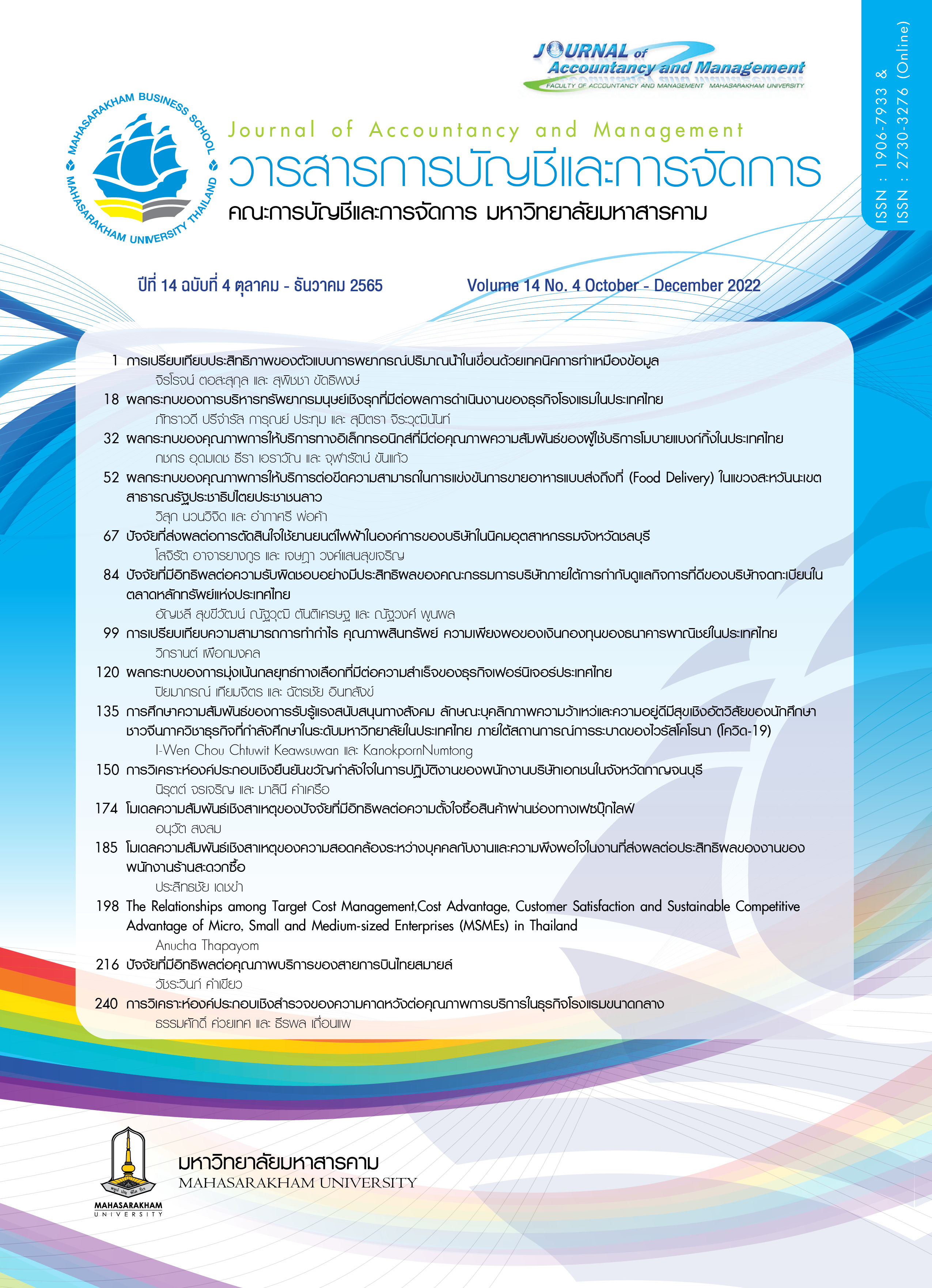ปัจจัยที่ส่งผลต่อการตัดสินใจใช้ยานยนต์ไฟฟ้าในองค์การ ของบริษัทในนิคมอุตสาหกรรมจังหวัดชลบุรี
Main Article Content
บทคัดย่อ
การวิจัยนี้มีวัตถุประสงค์เพื่อ 1) ศึกษาปัจจัยด้านพฤติกรรมองค์การที่ส่งผลต่อการตัดสินใจใช้ยานยนต์ไฟฟ้าในองค์การ และ 2) ศึกษาปัจจัยด้านการยอมรับเทคโนโลยีที่ส่งผลต่อการตัดสินใจใช้ยานยนต์ไฟฟ้าในองค์การ กลุ่มตัวอย่างที่ใช้ในการวิจัยคือ บริษัทในนิคมอุตสาหกรรม จังหวัดชลบุรี จำนวน 182 บริษัท เครื่องมือที่ใช้ในการวิจัยเป็นแบบสอบถาม โดยใช้วิธีการสุ่มตัวอย่างแบบเป็นระบบ สถิติที่ใช้ในการวิจัยคือ ค่าร้อยละ ค่าเฉลี่ย ส่วนเบี่ยงเบนมาตรฐาน และทดสอบสมมติฐานโดยใช้วิธีการหาค่าสัมประสิทธิ์สหสัมพันธ์แบบเพียร์สัน และวิธีการวิเคราะห์การถดถอยแบบพหุคูณ
ผลการวิจัยพบว่า บริษัทในนิคมอุตสาหกรรม จังหวัดชลบุรี ส่วนใหญ่ส่วนใหญ่ดำเนินธุรกิจยานยนต์หรือชิ้นส่วนประกอบ โดยรู้จักยานยนต์ไฟฟ้าแต่ไม่ใช้ยานยนต์ไฟฟ้าในการดำเนินงาน 1) ปัจจัยด้านพฤติกรรมองค์การ ที่ส่งผลต่อการตัดสินใจใช้ยานยนต์ไฟฟ้าในองค์การของบริษัทในนิคมอุตสาหกรรม จังหวัดชลบุรี ได้แก่ ด้านภาพลักษณ์ด้านการรักษาสิ่งแวดล้อม และนโยบายองค์การด้านเทคโนโลยี ตามลำดับ 2) ปัจจัยด้านการยอมรับเทคโนโลยี ที่ส่งผลต่อการตัดสินใจใช้ยานยนต์ไฟฟ้าในองค์การของบริษัทในนิคมอุตสาหกรรม จังหวัดชลบุรี ได้แก่ ด้านความง่ายในการใช้งานเทคโนโลยี ทัศนคติ และการรับรู้ประโยชน์จากการใช้ ตามลำดับ
Downloads
Article Details

อนุญาตภายใต้เงื่อนไข Creative Commons Attribution-NonCommercial-NoDerivatives 4.0 International License.
บทความที่ได้รับการตีพิมพ์เป็นลิขสิทธิ์ของวารสารการบัญชีและการจัดการ
ข้อความที่ปรากฏในบทความแต่ละเรื่องในวารสารวิชาการเล่มนี้เป็นความคิดเห็นส่วนตัวของผู้เขียนแต่ละท่านไม่เกี่ยวข้องกับมหาวิทยาลัยมหาสารคาม และคณาจารย์ท่านอื่นๆในมหาวิทยาลัยฯ แต่อย่างใด ความรับผิดชอบองค์ประกอบทั้งหมดของบทความแต่ละเรื่องเป็นของผู้เขียนแต่ละท่าน หากมีความผิดพลาดใดๆ ผู้เขียนแต่ละท่านจะรับผิดชอบบทความของตนเองแต่ผู้เดียว
เอกสารอ้างอิง
การนิคมอุตสาหกรรมแห่งประเทศไทย. (2561). รายชื่อโรงงาน. ค้นเมื่อ 16 พฤษภาคม 2562, จาก http://www.ieat.go.th
กันยารัตน์ มิ่งแก้ว และประสพชัย พสุนนท์. (2557). พฤติกรรมและความสัมพันธ์ของการตัดสินใจซื้อเครื่องมือแพทย์ กรณีศึกษาบริษัทสยาม อินเตอร์เนชั่นแนลเมดิคอล อิควิปเม้นท์ จำกัด. วารสารวิชาการ Veridian E-Journa, 7(2), 70.
เกศินี วิฑูรชาติ และคณะ. (2550). การวิเคราะห์เชิงปริมาณทางธุรกิจ. กรุงเทพฯ : มหาวิทยาลัยธรรมศาสตร์.
ชาญชัย อรรคผาติ. (2558). ปัจจัยที่ส่งผลต่อทัศนคติในการยอมรับในเทคโนโลยีคลาวด์คอมพิวติ้ง เพื่อประยุกต์ใช้ในการให้บริการระบบบัญชีออนไลน์ สำหรับวิสาหกิจขนาดกลางและขนาดย่อมในมุมมองของผู้ทำบัญชี. บัญชีมหาบัณฑิต. มหาวิทยาลัยธุรกิจบัณฑิตย์.
ณัฏฐ์พัชร์ ลาภบำรุงวงศ์. (2560). ภาวะผู้นำของผู้บริหารงานมีความสำคัญต่อการจัดการในพฤติกรรมองค์กร. วารสารวิชาการมหาวิทยาลัยปทุมธานี, 9(2), 276-277.
ธนชาติ เราประเสริฐ และการันต์ กิจระการ. (2563). ปัจจัยที่มีอิทธิพลต่อการตัดสินใจเลือกใช้บริการโรงพยาบาลเจ้าพระยาอภัยภูเบศร. วารสารการบัญชีและการจัดการ มหาวิทยาลัยมหาสารคาม, 12(3), 97-106.
นพมาศ เสียมไหม. (2555). การศึกษาการยอมรับการใช้เทคโนโลยีสารสนเทศ e-Government (G2E) ของข้าราชการระดับปฏิบัติการ กรณีศึกษา: สำนักงานปลัดกระทรวงมหาดไทย กับสำนักปลัดกระทรวงเทคโนโลยีสารสนเทศและการสื่อสาร. วิทยาศาสตรมหาบัณฑิต สาขาวิชาการบริหารเทคโนโลยี มหาวิทยาลัยธรรมศาสตร์.
ฝ่ายวิจัยนโยบาย สำนักงานพัฒนาวิทยาศาสตร์และเทคโนโลยีแห่งชาติ. (2560). อุตสาหกรรมยานยนต์ไฟฟ้า. ค้นเมื่อ 29 เมษายน 2562, จาก https://waa.inter.nstda.or.th/prs/pub/whitepaper_EVV2.pdf
มิ่งขวัญ ศรีทอง. (2559). ทัศนคติและปัจจัยที่ส่งผลต่อการตัดสินใจซื้ออุปกรณ์สวมใส่ (Wearable Device) ในรูปแบบสายรัดข้อมือของผู้บริโภคในเขตกรุงเทพมหานครและปริมณฑล. บริหารธุรกิจมหาบัณฑิต มหาวิทยาลัยธรรมศาสตร์.
ยศพงษ์ ลออนวล. (2558). รายงานการวิจัย พัฒนาและวิศวกรรม ฉบับสมบูรณ์ รหัสโครงการ P-12-01114. ค้นเมื่อ 29 เมษายน 2561, จาก ttp://energyforum.kmutt.ac.th
วิภาวรรณ มโนปราโมทย์. (2558). ปัจจัยที่มีอิทธิพลต่อการตัดสินใจซื้อสินค้าผ่านสังคมออนไลน์ (อินสตราแกรม) ของประชากรในกรุงเทพมหานคร. บริหารธุรกิจมหาบัณฑิต มหาวิทยาลัยกรุงเทพ.
วิมลวรรณ สุวรรณรักษ์ และธัญวรัตน์ สุวรรณะ. (2560). การเปรียบเทียบการยอมรับนวัตกรรมทางการเงินของธนาคารเอกชนกับธนาคารรัฐบาล ในเขตกรุงเทพฯ และปริมณฑล กรณีศึกษาธนาคารกรุงเทพ จำกัด (มหาชน) กับ ธนาคารกรุงไทย จำกัด (มหาชน). วารสารวิชาการมหาวิทยาลัยปทุมธานี, 9(1), 34-42.
วิยะดา หมัดอุสัน อมรรัตน์ จิระศึกษา และพิทักษ์ ศิริวงศ์. (2557). การให้ความหมาย รูปแบบ และกลยุทธ์การดำเนินกิจกรรมความรับผิดชอบต่อสังคมบริษัท เทคโนเซล (เฟรย์) จำกัด. วารสารวิชาการ Veridian E-Journal, 7(2), 1249-1262.
วรรณา ยงพิศาลภพ. (2563). ประเทศไทยกับการพัฒนาเทคโนโลยีรถยนต์ไฟฟ้า. ค้นเมื่อ 25 เมษายน 2564, จาก https://thaipublica.org/wp-content/uploads/2017/06/เทคโนโลยีรถยนต์ไฟฟ้า.pdf
ศูนย์เทคโนโลยีสารสนเทศและการสื่อสาร. (2561). การปล่อยก๊าซคาร์บอนไดออกไซด์ (CO2) จากการใช้พลังงานปี 2561. ค้นเมื่อ 24 เมษายน 2564, จาก http://www.eppo.go.th/index.php/th/energy-information/situation-co2/per-year?orders[publishUp]=publishUp&issearch=1
สิงหะ ฉวีสุข และสุนันทา วงศ์จตุรภัทร. (2555). ทฤษฎีการยอมรับการใช้เทคโนโลยีสารสนเทศ. วารสารเทคโนโลยีสารสนเทศลาดกระบัง, 1(1), 2-11.
อัมพร ชูโลก. (2553). ความสัมพันธ์ระหว่างกิจกรรมความรับผิดชอบต่อสังคม และภาพลักษณ์ขององค์กรธุรกิจสายงานก๊าซธรรมชาติสำหรับยานยนต์ กลุ่มธุรกิจก๊าซธรรมชาติ บริษัท ปตท. จำกัด (มหาชน). ปริญญาบริหารธุรกิจมหาบัณฑิต มหาวิทยาลัยศรีปทุม.
อรรถสิทธิ์ แจ่มฟ้า. (2559). รถยนต์ไฟฟ้ากับการเปลี่ยนแปลงของอุตสาหกรรรมรถยนต์ไทย. ค้นเมื่อ 29 เมษายน 2561, จาก https://www.gsb.or.th/GSB-Research/เศรษฐกิจอุตสาหกรรม/รายงานการวิเคราะห์ประเด็นร้อน/8IN_hotissue_car_detail.aspx?lang=th-TH
Ajzen, I. (1985). From intention to actions: A theory of planned behavior. In: Kuhl, J. and Beckmann, J. (Eds.). Action control: From cognition to behavior. Berlin : Springer-Verlag.
Bandure, A. (1986). Social Foundations of Thought and Action: A Social Cognitive Theory. Englewood Cliffs, NJ : Prentice Hall.
Baron, R. A. & Greenberg, J. (1990). Behavior in Organizations: Understanding and Managing the Human Side Work. (3rd ed). Boston : Allyn and Bacon.
Davis, F. (1985). A technology acceptance model for empirically testing new end-user information systems: theory and results. Cambridge : MIT Sloan School of Management.
Fishbein, M. & Ajzen, I. (1975). Attitude, Intention and Behavior: An Introduction to Theory and Research. Massachusetts : Addison-Wesly.
Gibson, J. L., Ivancevich, J. M., & Donnelly, J. H. (1997). Organizations, Behavior, Structure, Processes. (9th ed.). Boston : Mc Graw - Hill.
Middlemist, R. D., & Hitt, M.A. (1988). Organization behavior: Managerial strategies. St. Paul : West Publishing.
Moorhead, G. & Griffin, R.W. (1995). Organizational behavior. (4th ed). Boston : Houghton Mifflin.
Rogers, E. M. (1995). Diffusion of Innovations. (4th ed). New York : The free press.
Taylor, S. & Todde, P. A. (1995). Assessing IT Usage: The Role of Prior Experience. MIS Quaterly, 19(2), 561-570.
Thompson, R. L., Higgins, C. A., & Howell, J. M. (1991). Personal Computing: Toward a conceptual model of utilization. MIS Quarterly, 15(1), 124–143.
Vallerand, R. J. (1997). Toward a Hierarchical Model of Intrinsic and Extrinsic Motivation, In Advances in Experimental Social Psychology. (4th ed). New York : Academic Press.
Venkatesh, V. & Davis, F. (2000). A theoretical extension of the technology acceptance model: for longitudinal field studies. Management Science, 46(2), 186-204.
Venkatesh, V., Morris, M., & Davis, G. B. (2003). User acceptance of information technology: Toward a unified view. MIS Quarterly, 27(3), 425-478.
Venkatesh, V., Thong, J. Y. L., & Xu, X. (2012). Consumer acceptance and use of information technology: Extending the unified theory of acceptance and use of technology. MIS Quartery, 36(1), 157-178.
Webster, F. E. & Wind, Y. (1972). A general model for understanding organizational buying behavior. Journal of Marketing, 36(2), 12-19.
Yamane, T. (1973). Statistics : An Introductory Analysis. (3rd ed). New York : Harper and Row Publications.


